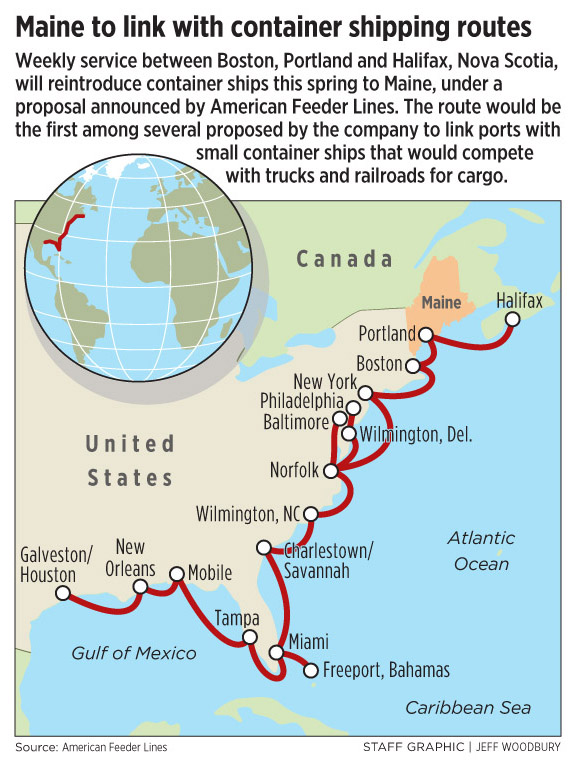PORTLAND — Portland will be a port of call for weekly container ship service being launched this spring on the Atlantic coast, a start-up shipping company announced today.â¨
New York-based American Feeder Lines is planning to connect a string of ports from Portland to Miami, and possible the Gulf coast to Texas, with container ships along a proposed American marine highway. The service envisions a hub-and-spoke network, in which imported cargo from large container vessels moves to smaller ports on a fleet of feeder ships. For exports, the smaller ships feed the big vessels. Cargo also could move between domestic ports.â¨
This so-called short-sea container service is common in other countries, but has had difficulty getting a foothold in the United States, where it competes with truck and rail freight. It’s getting a boost from a federal effort – the Marine Highway Program – aimed at reducing air pollution and truck traffic by moving freight off highways and onto nearby marine corridors.â¨
Portland would be on the first leg of this new venture, part of a connection between Boston and Halifax, Nova Scotia. The service will be called the New England-Halifax Shuttle. The company is still considering a charter agreement with a ship that will call on Portland, but says the vessel would have the capacity to carry roughly 550 standard, 40-foot-long containers.â¨
American Feeder Lines is planning to build 10 small container ships in United States shipyards, to comply with federal laws for domestic shipping. It is still working to secure financing for the first ship, which will take two years to build.
â¨But the company will be able to begin Boston-Portland-Halifax service now by chartering an existing, foreign-flagged vessel. That’s a way to enter a market with pent-up demand and attract financing for construction, according to John Henshaw, executive director of the Maine Port Authority.â¨
“They’re trying to establish their credentials, and this allows them to get into the market early,” Henshaw said. “They’re anxious to get up and running, and this is sort of a stepping stone.”â¨
The service will be good news for Portlandâ’s International Marine Terminal, which has had a hard time maintaining reliable service in recent years. It hasn’t seen regular cargo ships since September, when a barge that carried pulp to New York stopped calling. It previously lost weekly container service to Halifax in 2008, when the operator suspended operations.â¨
Maine businesses including a liquor distiller and stove manufacturer have used cargo ships, according to Henshaw, and L.L. Bean has expressed interest in importing products by sea. But the greatest potential export traffic is from the state’s pulp and paper industry, he said, which now trucks much of its output to Boston or New York.â¨
“This is something we’ve tried to reestablish since 2008,” he said.â¨
American Feeder Lines is trying to set up feeder and domestic freight service on the Atlantic and Gulf coasts that supports international container lines. This concept will complement the introduction of a new fleet of massive ships designed to traverse the widened Panama Canal, the company says.â¨
The company is familiar with Portland because Rudy Mack, the chief operating officer, ran a similar service in New England during the 1980s, while at the Hapag Lloyd shipping company. He is aware that Maine paper makers are trucking product to New York and New Jersey for export instead of shipping through Halifax, which is home to 15 major shipping lines. They can provide global connections for Maine, he said.â¨
“We will connect Maine exporters to the rest of the world,” Mack said.â¨
Mack said he expects the route to grow slowly, as some shippers wait to see if the company can provide reliable service. It will take time to build credibility, he said.â¨
“A lot of companies have tried and not succeeded,” he said.
To succeed over the long term, the company must gain traffic and raise money to build its fleet of container ships in the United States. The vessels it plans to build will be especially fuel efficient, running on low-sulfur fuel and biodiesel, and will limit emissions associated with climate change. To move the same amount of freight, they will produce 27 percent less carbon dioxide per mile than rail, and 77 percent less than truck, according to the company’s calculations.
American Feeder Lines’ announcement was welcomed by Jack Humeniuk, who represents the International Longshoremen’s Association. His members are largely idle during the winter. The new service will put up to 20 people to work every week, unloading cargo and operating the terminal.â¨
“This is really the bread and butter of our business,” he said.â¨
Send questions/comments to the editors.




Success. Please wait for the page to reload. If the page does not reload within 5 seconds, please refresh the page.
Enter your email and password to access comments.
Hi, to comment on stories you must . This profile is in addition to your subscription and website login.
Already have a commenting profile? .
Invalid username/password.
Please check your email to confirm and complete your registration.
Only subscribers are eligible to post comments. Please subscribe or login first for digital access. Here’s why.
Use the form below to reset your password. When you've submitted your account email, we will send an email with a reset code.